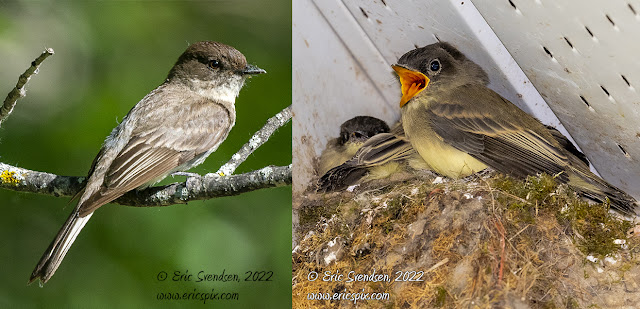Flycatcher - Eastern Wood Pewee.
Flycatchers. The name says it all. They catch flies, but really all flying insects, which means you won't find them anywhere too cold to allow insects to take to wing. There are quite a few with the word "flycatcher" in the name, but many are of the same group but with different monikers.
The Tyrannadae is the largest grouping of birds in any family of birds. There are over 400 species. North America alone has about 36 different species. These include not only birds named flycatcher but also the phoebes (pronounced fee-bees), kingbirds, kiskadees, tyrannulets, and pewees. To see a list with pictures and links, click here.
They are small to mid-sized birds ranging from chickadee-sized to robin-sized. They all catch insects in the air but will also hover with great expertise and pick off insects adorning easily accessed parts of trees and other plants. Catching an insect on the wing is no easy task; I have romped after the odd butterfly and I have to say my success has been extremely limited, even when using a net. To aid in this they have very specific adaptations.
First off are the vibrissae. These are stiff hair-like feathers beside the mouth that aid in corralling their areal meals. Their small size and modified wings allow them to hover and even fly backward, a feat not all birds can attest to. They will even catch insects that have stingers but they avoid being harpooned by rubbing the captured insect on a tree branch to remove the defensive weapon. The tiny hook at the end of the bill helps them catch and hold prey.
I thought that the above flycatcher was a Say's phoebe. After I posted this I got a reply that it was an eastern wood pewee. I do not think this will be the last time I am stimied by a flycatcher. That's one of the problems with identifying flycatchers; they often are similar in appearance.
Thanks for reading. www.ericspix.com




Comments
Post a Comment